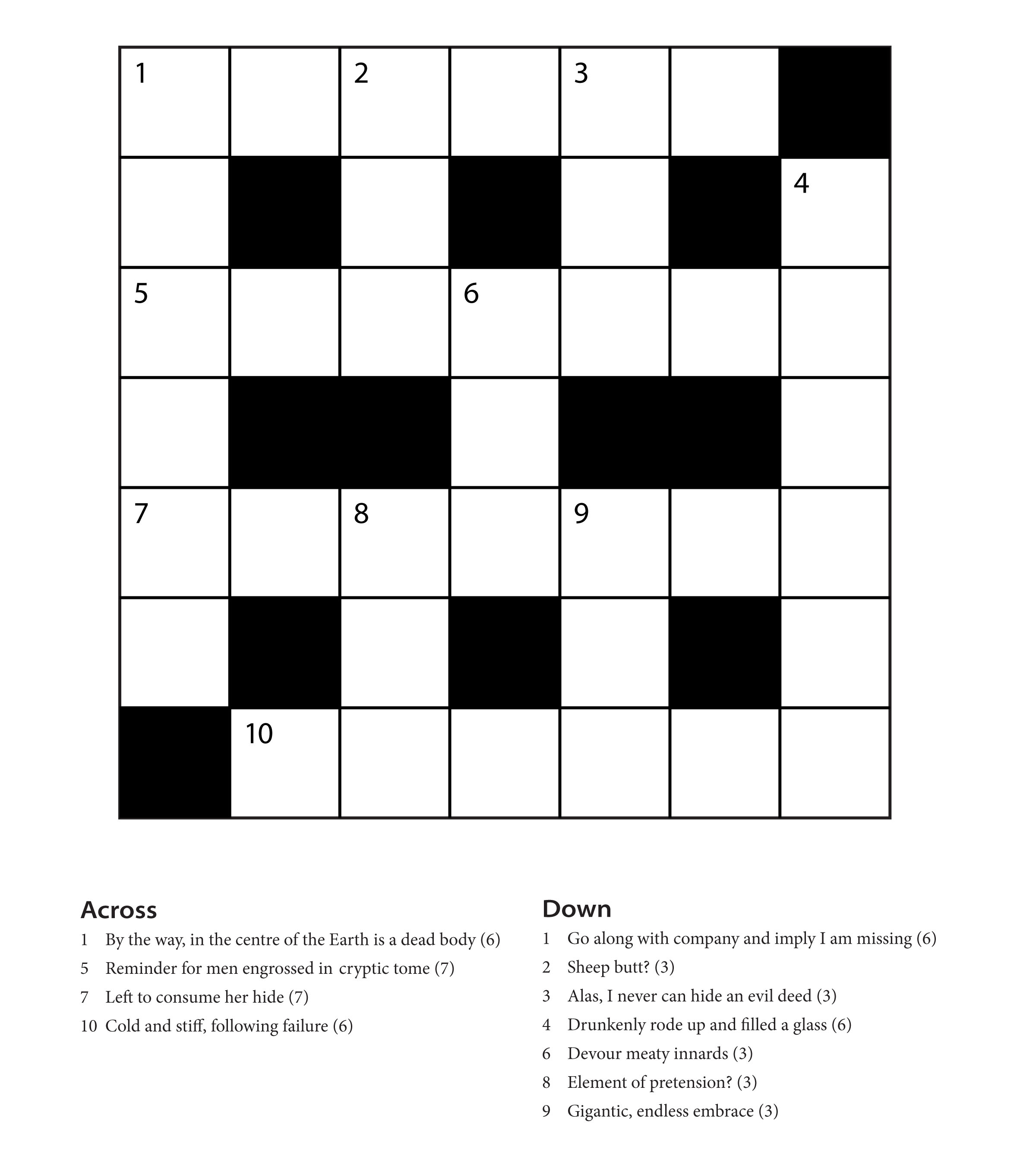
In this example, we are looking for a word meaning ‘afternoon nap’ and will find it in the two-word phrase ‘Maisie’s tavern’. Can you spot a type of house hidden in the wording of the clue? Again, ignore the spaces between the words. The pointer that lets us know the type of clue this time is an even more obvious word than ‘concealed’ – it’s the very simple ‘in’. Even though the answer here is hidden within a two-word phrase rather than in a single word, it is still there in its entirety, with all the letters in the right order, and remains relatively easy to spot. Here we can see that there must be a word meaning ‘snake’ hidden in the phrase ‘skimpy thong.’ Don’t get put off by the space between the words. This clue is constructed on very similar lines to the first one, and even uses the same pointer word ‘concealed’. In the following more complex examples, the answer each time is spread over two words in the clue, so may not be so immediately clear:

In this example, it has something to do with ‘relationship’ and is hidden in the word ‘operation’. It is telling us that the answer we seek is hidden in the clue. Our pointer here is the word ‘concealed’. Relationship is concealed during operation (5)

Here’s a very easy clue to show you what I mean:
There will again be a word or phrase to tell you the meaning of the answer you are looking for. #Cryptic crosswords series
There will be a word or series of words in which the answer is hidden. There will be a pointer – a word or two to hint that the answer is included in the wording of the clue and is therefore probably staring you in the face!. So, how do we know that this is what is required? How can we spot an ‘answer in the question’ clue? Just as in anagrams, we can expect three parts to the clue: LOOKING FOR HIDDEN WORDS Recognising the Signs That’s how addictive crosswords can become. There have even been a few occasions when I’ve been forced to admit defeat and had to wait a day or two for the answers to be published in a later edition of the newspaper before achieving anything like peace of mind. And nights when I’ve been unable to go to bed knowing that there is still one unsolved clue staring up at me. There have been many times when I’ve sat for hours, pen in hand, unable to concentrate on anything else, determined to finish a devilishly difficult puzzle, no matter how long it takes. And we all like to feel intelligent, and proud of ourselves, from time to time!īut, of course, crosswords can be infuriating too. Crosswords are usually a much more solitary pursuit, which makes their successful completion all the more satisfying. A bit like playing a game of Scrabble or Boggle, it lets us explore language, learn new words, and play around with letters in a fun way – but without the need for a board, a timer or an opponent. It can also help us to improve our spelling and vocabulary, expand our general knowledge and, if we manage to finish it, boost our self-esteem. But ‘doing’ a crossword offers much more than just an hour or two of idle fun. Unless you are taking the whole thing very seriously indeed and travelling the world to compete in crossword competitions (and, yes, some people do!) it ’s usually just the cost of a magazine, newspaper or puzzle book, and the pen or pencil needed to write in the answers!įilling in a crossword helps to pass the time on boring train journeys, and gives you something relaxing to do while you drink your morning coffee, laze in a hot bath or have your hair done. It’s a fascinating hobby that costs very little to pursue. In fact, solving a daily puzzle has been shown to help reduce the risk of dementia and Alzheimer’s, or at least to delay its onset.įrom the simplest clues you might find in a magazine’s ‘coffee break’ puzzle page to the real stinkers in the more high-brow daily newspapers (the sort of clues that can take hours to understand, let alone solve!) there is a definite sense of achievement when you see those little white boxes in the grid slowly filling up as you get nearer and nearer to completing your puzzle. 
They help you to keep your brain function in good working order and slow down the memory loss that inevitably creeps up on us as we get older.

There is something very satisfying about completing a crossword puzzle. Are you baffled by cryptic crosswords? Do you want to increase your word power and exercise your brain, but can’t make any sense of the clues? There is no secret formula to cracking the cryptic crossword.








 0 kommentar(er)
0 kommentar(er)
